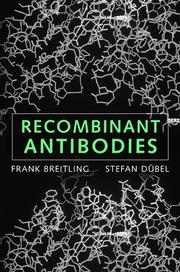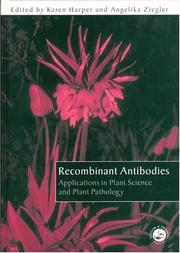| Listing 1 - 9 of 9 |
Sort by
|

Abstract | Keywords | Export | Availability | Bookmark
 Loading...
Loading...Choose an application
- Reference Manager
- EndNote
- RefWorks (Direct export to RefWorks)
Periodical
Abstract | Keywords | Export | Availability | Bookmark
 Loading...
Loading...Choose an application
- Reference Manager
- EndNote
- RefWorks (Direct export to RefWorks)
Recombinant antibodies --- Medicine --- Recombinant antibodies. --- Medicine.
Book
ISBN: 1282830538 9786612830532 3642011470 3642011462 3642422764 Year: 2010 Publisher: Berlin : Springer,
Abstract | Keywords | Export | Availability | Bookmark
 Loading...
Loading...Choose an application
- Reference Manager
- EndNote
- RefWorks (Direct export to RefWorks)
Antibodies are indispensable tools for research, diagnosis, and therapy. Recombinant approaches allow the modification and improvement of nearly all antibody properties, such as affinity, valency, specificity, stability, serum half-life, effector functions, and immunogenicity. Antibody Engineering provides a comprehensive toolbox covering the well-established basics but also many exciting new techniques. The protocols reflect the latest "hands on" knowledge of key laboratories in this still fast-moving field. Newcomers will benefit from the proven step-by-step protocols, which include helpful practical advice; experienced antibody engineers will appreciate the new ideas and approaches. The book is an invaluable resource for all those engaged in antibody research and development.
Immunology. --- Monoclonal antibodies. --- Antibodies. --- Immunobiology --- Life sciences --- Serology --- Antibodies, Monoclonal --- Monoclonal immunoglobulins --- Immunoglobulins --- Molecular cloning --- Recombinant antibodies

ISBN: 0748407634 Year: 1999 Publisher: London : Taylor & Francis,
Abstract | Keywords | Export | Availability | Bookmark
 Loading...
Loading...Choose an application
- Reference Manager
- EndNote
- RefWorks (Direct export to RefWorks)
Plante --- plants --- Anticorps monoclonal --- monoclonal antibodies --- Réaction antigène anticorps --- antigen antibody reactions --- Métabolisme --- Metabolism --- Biologie moléculaire --- Molecular biology --- Génie génétique --- genetic engineering --- diagnosis --- Immunogénétique --- Immunogenetics --- Plante transgénique --- Transgenic plants --- Biotechnologie végétale --- Plant biotechnology --- Substance de croissance végétale --- plant growth substances --- Plant diseases. --- Plant molecular biology. --- Recombinant antibodies. --- Plant immunology.
Book
ISBN: 1282830546 9786612830549 3642011446 3642011438 9783642011436 9783642011467 3642011462 9783642011443 9783642011474 3642011470 Year: 2010 Publisher: Heidelburg Springer
Abstract | Keywords | Export | Availability | Bookmark
 Loading...
Loading...Choose an application
- Reference Manager
- EndNote
- RefWorks (Direct export to RefWorks)
Antibodies are indispensable tools for research, diagnosis, and therapy. Recombinant approaches allow the modification and improvement of nearly all antibody properties, such as affinity, valency, specificity, stability, serum half-life, effector functions, and immunogenicity. Antibody Engineering provides a comprehensive toolbox covering the well-established basics but also many exciting new techniques. The protocols reflect the latest "hands on" knowledge of key laboratories in this still fast-moving field. Newcomers will benefit from the proven step-by-step protocols, which include helpful practical advice; experienced antibody engineers will appreciate the new ideas and approaches. The book is an invaluable resource for all those engaged in antibody research and development.
Immunology. --- Monoclonal antibodies. --- Biotechnology. --- Antibodies. --- Chemical engineering --- Genetic engineering --- Antibodies, Monoclonal --- Monoclonal immunoglobulins --- Immunoglobulins --- Molecular cloning --- Immunobiology --- Life sciences --- Serology --- Recombinant antibodies --- Antibodies --- DNA, Recombinant --- Antibody Formation --- Genetic Engineering --- 57.083 --- Genetically engineered antibodies --- Recombinant immunoglobulins --- Recombinant proteins --- 57.083 Microbiological, virological, immunological methods and techniques --- Microbiological, virological, immunological methods and techniques --- genetics --- immunology --- methods
Book
ISBN: 3319720775 3319720767 Year: 2017 Publisher: Cham : Springer International Publishing : Imprint: Springer,
Abstract | Keywords | Export | Availability | Bookmark
 Loading...
Loading...Choose an application
- Reference Manager
- EndNote
- RefWorks (Direct export to RefWorks)
There are many principles and applications of recombinant antibodies for infectious diseases. The preferred technology associated to recombinant antibody generation is mainly phage display. The adaptation of antibodies for infectious diseases is an area lacking information as most literature is focused on oncology or autoimmunity. This project highlights the power and potential of antibody phage display for infectious diseases. In addition to that, supplementary information regarding technologies associated to antibody generation and engineering in the context of infectious disease will also help to provide greater insight to the potential of recombinant antibodies for infectious diseases.
Recombinant antibodies. --- Communicable diseases. --- Medicine. --- Antibodies. --- Infectious diseases. --- Biomedicine. --- Infectious Diseases. --- Antibodies --- Immune globulins --- Immune serum globulin --- Blood proteins --- Globulins --- Plasma cells --- Antibody diversity --- Antigens --- Bacterial immunoglobulin-binding proteins --- Clinical sciences --- Medical profession --- Human biology --- Life sciences --- Medical sciences --- Pathology --- Physicians --- Contagion and contagious diseases --- Contagious diseases --- Infectious diseases --- Microbial diseases in human beings --- Zymotic diseases --- Diseases --- Infection --- Epidemics --- Genetically engineered antibodies --- Recombinant immunoglobulins --- Immunoglobulins --- Recombinant proteins --- Monoclonal antibodies. --- Emerging infectious diseases. --- Emerging infections --- New infectious diseases --- Re-emerging infectious diseases --- Reemerging infectious diseases --- Communicable diseases --- Antibodies, Monoclonal --- Monoclonal immunoglobulins --- Molecular cloning
Book
Year: 2022 Publisher: Basel MDPI - Multidisciplinary Digital Publishing Institute
Abstract | Keywords | Export | Availability | Bookmark
 Loading...
Loading...Choose an application
- Reference Manager
- EndNote
- RefWorks (Direct export to RefWorks)
Since first receiving approval in 1986, antibody-based therapeutics have been the most successful modality for the treatment of various diseases. This Special Issue of IJMS, “Recent Advances in Antibody Therapeutics”, presents leading-edge articles and reviews for discovery, development, and clinical applications of therapeutic antibodies, covering antibody drug conjugates (ADCs), GPCR-targeting antibodies, a functional antibody screening, bioassay of bispecific antibodies, antibody applications for cardiovascular diseases, antibody delivery to CNS, etc. The excellent studies in this Special Issue would valuable insight for scientists and clinicians in the field of therapeutic antibodies
Research & information: general --- Chemistry --- interleukin 33 --- ST2 receptor --- scFv --- C2_2E12 --- bladder cancer --- antibodies --- immune checkpoint inhibitors --- antibody-drug conjugates --- sacituzumab govitecan --- enfortumab vedotin --- erdafitinib --- cost-effectiveness --- G protein-coupled receptor --- membrane protein --- antigen --- therapeutic antibody --- anti-angiogenesis --- delta-like ligand --- irinotecan --- paclitaxel --- VEGF --- SARS-CoV-2 --- spike protein --- receptor-binding domain --- phage display --- monoclonal antibody --- cytomegalovirus --- peptide/major histocompatibility complex class I complex --- T-cell-receptor-like antibody --- affinity maturation --- yeast surface display --- combinatorial antibody library --- agonist antibody --- cell fate --- bispecific antibodies --- bioassays --- mechanisms of action --- binding assays --- potency assays --- atherosclerosis --- inflammation --- antibody therapy --- blood–brain barrier --- antibody --- pharmacokinetics --- disposition --- biochemical and physicochemical properties --- Fc binding --- receptor-mediated transcytosis --- brain shuttle --- molecular Trojan horse --- transferrin --- anti-cancer antibody --- antibody engineering --- biophysical properties --- computational methods --- research cell bank --- antibody therapeutics --- recombinant antibodies --- intracellular antibodies --- single-chain antibody fragment --- nanobody --- Human papillomaviruses --- HPV oncoproteins --- HPV-associated cancer --- HPV cancer therapy --- asthma --- refractory asthma --- biomarker --- n/a --- blood-brain barrier
Book
Year: 2022 Publisher: Basel MDPI - Multidisciplinary Digital Publishing Institute
Abstract | Keywords | Export | Availability | Bookmark
 Loading...
Loading...Choose an application
- Reference Manager
- EndNote
- RefWorks (Direct export to RefWorks)
Since first receiving approval in 1986, antibody-based therapeutics have been the most successful modality for the treatment of various diseases. This Special Issue of IJMS, “Recent Advances in Antibody Therapeutics”, presents leading-edge articles and reviews for discovery, development, and clinical applications of therapeutic antibodies, covering antibody drug conjugates (ADCs), GPCR-targeting antibodies, a functional antibody screening, bioassay of bispecific antibodies, antibody applications for cardiovascular diseases, antibody delivery to CNS, etc. The excellent studies in this Special Issue would valuable insight for scientists and clinicians in the field of therapeutic antibodies
interleukin 33 --- ST2 receptor --- scFv --- C2_2E12 --- bladder cancer --- antibodies --- immune checkpoint inhibitors --- antibody-drug conjugates --- sacituzumab govitecan --- enfortumab vedotin --- erdafitinib --- cost-effectiveness --- G protein-coupled receptor --- membrane protein --- antigen --- therapeutic antibody --- anti-angiogenesis --- delta-like ligand --- irinotecan --- paclitaxel --- VEGF --- SARS-CoV-2 --- spike protein --- receptor-binding domain --- phage display --- monoclonal antibody --- cytomegalovirus --- peptide/major histocompatibility complex class I complex --- T-cell-receptor-like antibody --- affinity maturation --- yeast surface display --- combinatorial antibody library --- agonist antibody --- cell fate --- bispecific antibodies --- bioassays --- mechanisms of action --- binding assays --- potency assays --- atherosclerosis --- inflammation --- antibody therapy --- blood–brain barrier --- antibody --- pharmacokinetics --- disposition --- biochemical and physicochemical properties --- Fc binding --- receptor-mediated transcytosis --- brain shuttle --- molecular Trojan horse --- transferrin --- anti-cancer antibody --- antibody engineering --- biophysical properties --- computational methods --- research cell bank --- antibody therapeutics --- recombinant antibodies --- intracellular antibodies --- single-chain antibody fragment --- nanobody --- Human papillomaviruses --- HPV oncoproteins --- HPV-associated cancer --- HPV cancer therapy --- asthma --- refractory asthma --- biomarker --- n/a --- blood-brain barrier
Book
Year: 2022 Publisher: Basel MDPI - Multidisciplinary Digital Publishing Institute
Abstract | Keywords | Export | Availability | Bookmark
 Loading...
Loading...Choose an application
- Reference Manager
- EndNote
- RefWorks (Direct export to RefWorks)
Since first receiving approval in 1986, antibody-based therapeutics have been the most successful modality for the treatment of various diseases. This Special Issue of IJMS, “Recent Advances in Antibody Therapeutics”, presents leading-edge articles and reviews for discovery, development, and clinical applications of therapeutic antibodies, covering antibody drug conjugates (ADCs), GPCR-targeting antibodies, a functional antibody screening, bioassay of bispecific antibodies, antibody applications for cardiovascular diseases, antibody delivery to CNS, etc. The excellent studies in this Special Issue would valuable insight for scientists and clinicians in the field of therapeutic antibodies
Research & information: general --- Chemistry --- interleukin 33 --- ST2 receptor --- scFv --- C2_2E12 --- bladder cancer --- antibodies --- immune checkpoint inhibitors --- antibody-drug conjugates --- sacituzumab govitecan --- enfortumab vedotin --- erdafitinib --- cost-effectiveness --- G protein-coupled receptor --- membrane protein --- antigen --- therapeutic antibody --- anti-angiogenesis --- delta-like ligand --- irinotecan --- paclitaxel --- VEGF --- SARS-CoV-2 --- spike protein --- receptor-binding domain --- phage display --- monoclonal antibody --- cytomegalovirus --- peptide/major histocompatibility complex class I complex --- T-cell-receptor-like antibody --- affinity maturation --- yeast surface display --- combinatorial antibody library --- agonist antibody --- cell fate --- bispecific antibodies --- bioassays --- mechanisms of action --- binding assays --- potency assays --- atherosclerosis --- inflammation --- antibody therapy --- blood-brain barrier --- antibody --- pharmacokinetics --- disposition --- biochemical and physicochemical properties --- Fc binding --- receptor-mediated transcytosis --- brain shuttle --- molecular Trojan horse --- transferrin --- anti-cancer antibody --- antibody engineering --- biophysical properties --- computational methods --- research cell bank --- antibody therapeutics --- recombinant antibodies --- intracellular antibodies --- single-chain antibody fragment --- nanobody --- Human papillomaviruses --- HPV oncoproteins --- HPV-associated cancer --- HPV cancer therapy --- asthma --- refractory asthma --- biomarker
| Listing 1 - 9 of 9 |
Sort by
|

 Search
Search Feedback
Feedback About UniCat
About UniCat  Help
Help News
News